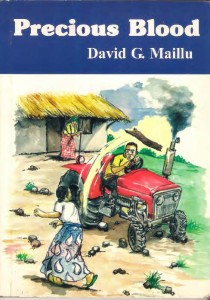By Edwin Amoro
Published October 30, 2014
 That focus, discipline and hard work are the keys to success in anything one sets one’s mind on isn’t about to be contested. This appears to be the focus of Precious Blood, a 96-page story book for children written by David G Maillu.
That focus, discipline and hard work are the keys to success in anything one sets one’s mind on isn’t about to be contested. This appears to be the focus of Precious Blood, a 96-page story book for children written by David G Maillu.
Precious Blood is set on the premise that organisations, including families, often disintegrate as soon as their leader dies. In the book under review, a family is left destitute, on someone else’s land, when its sole bread-winner dies leaving behind a crippled widow and six helpless toddlers. Will the family survive? What can Katilo, the eldest child, a girl, do to put smiles to the faces of her family?
RELATED: New Kenyan Novel Dreams of Things That Never Were and Asks Why Not
The book tackles issues like greed, jealousy, mercy, forgiveness and hard work in a way that a young reader can understand. Maillu uses the family as a platform to show the focus and the hard work people engage in for self-reliance. The family unit serves as a good example to the society that poverty is not permanent.
The theme of hard work is revealed through the elder daughter of the family who rises up to fill in the gap left by her dead father as the main bread winner. Their success, however, invites jealousy and ill-will from others who decide to destroy their property.
Hard work, never giving up and dreaming big are the major lessons to readers of Precious Blood. Without focus and hard work dreams and objectives cannot be achieved. The writer encourages the reader not to give up in life, even if the challenges appear to be insurmountable. Being creative and innovative is also an added advantage on earth because we are living in a competitive world where uniqueness matters.
RELATED: How Kenya’s Tribalism and Corruption Destroy Intellectual Enterprises
The writer uses short sentences, simple words and language with correct punctuation marks to make the reader understand his message. This clear language, coupled with large print and realistic illustrations of what is happening in the story, make the book that is published by Phoenix Publishers of Nairobi and costing Sh150 (about US$3) per copy all the more enjoyable to the young reader.
Though the story is engaging and gives the reader the courage with which to face challenges of life, one fails to connect it with the title of the book; Precious Blood. What does it mean? How and where does is it fit in the story?





